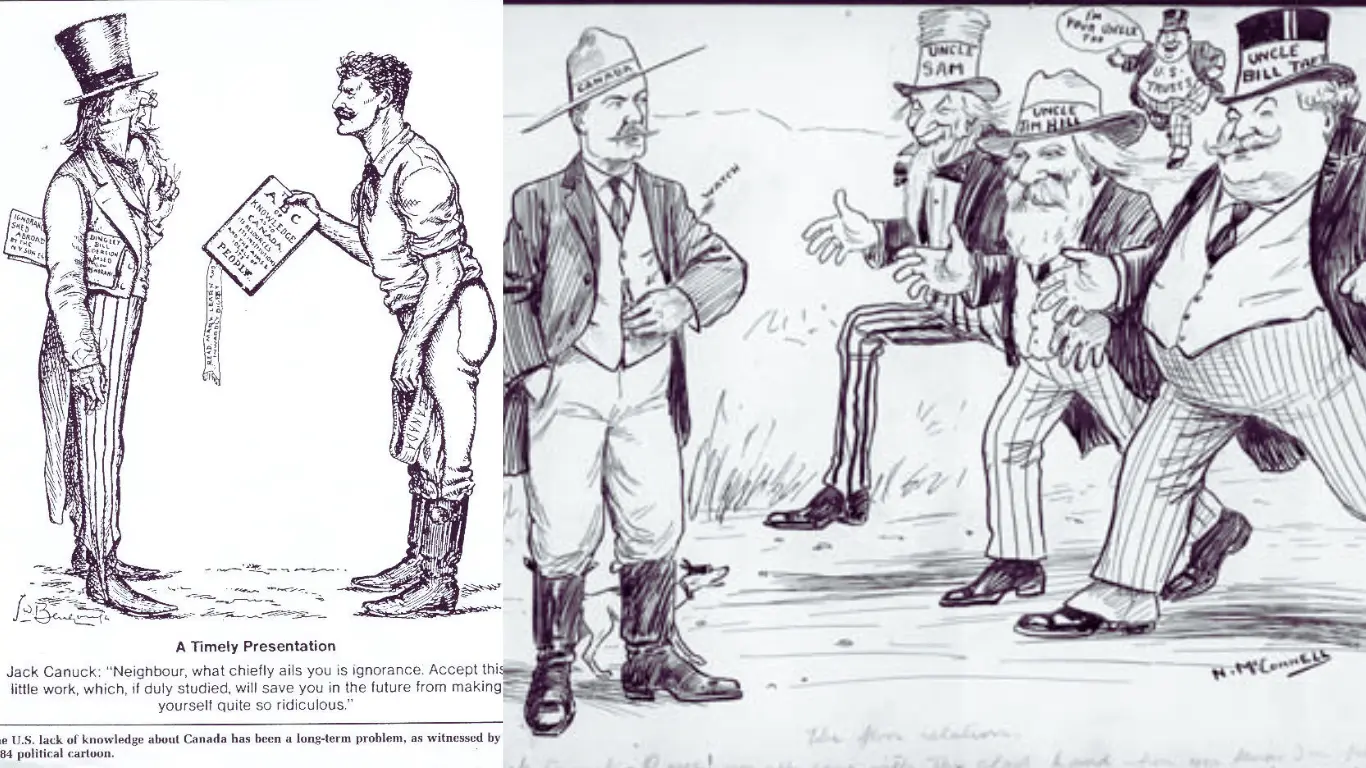Introduction to the Term “Canuck”
“Canuck” is a colloquial term used to refer to a Canadian. Although it has sometimes been considered offensive, it is more commonly used with a sense of national pride. The term’s etymology is not entirely clear, but it appears to have originated in the 19th century as a nickname. It has been suggested that the word could derive from the Hawaiian word “kanaka,” meaning “person,” which was used by Hawaiians themselves and by others during the fur trade era to refer to the native people and the French Canadians involved in the trade. Alternatively, “Canuck” might also stem from the Irish expression “Connaught,” a term used to refer to Irish immigrants from the Connaught region in Canada. Over time, “Canuck” has become embedded in Canadian culture, symbolizing national identity, especially in sports and media, where it denotes enthusiasm and pride in being Canadian.
Historical Origins
The term “Canuck” has been used colloquially to refer to Canadians, though its origins and initial application are subject to varied historical interpretations. The first documented usage of “Canuck” traces back to 1835, when it appears in American writing to distinguish French or Dutch Canadians using the term “Kanuk”. Over time, it has often been associated with French Canadian loggers, especially those working in the lumber camps of Maine during the 19th century, where it was used to identify these workers distinctly.
Interestingly, there is also a claim that Jacques Cartier, the French explorer who played a significant role in Canadian history, might have used the term during his explorations around Quebec City and Montreal in the early 16th century. This suggests the term could have much older, albeit less documented, origins in Canadian history. Regardless of its exact inception, “Canuck” remains a term emblematic of Canadian identity, often used with pride despite its varied implications.
Cultural Significance
In Canadian Society
This nickname is largely embraced with pride, reflecting a national identity that is informal and friendly.
- General Use: “Canuck” is commonly used across Canada as a slang term for Canadian. It is often wielded with pride, although it can sometimes bear a negative implication depending on context.
- Sports and Branding: The term is notably used in sports, specifically by the Vancouver Canucks, an NHL hockey team. This shows a localized pride in the term, particularly in British Columbia.
- Regional Differences: In some regions, especially where the identity around the Vancouver Canucks isn’t as strong, “Canuck” may not resonate as strongly or may be viewed more neutrally. This is observed in areas like Quebec, where the term and the team may not carry the same emotional weight.
In summary, while “Canuck” is generally seen as a positive term and embraced nationally, its usage and impact can vary by region and context, reflecting the diverse cultural landscape of Canada.
In Global Perception
The term “Canuck,” while being a colloquial nickname for Canadians, holds different connotations and levels of recognition outside of Canada:
- General Awareness: Internationally, “Canuck” is recognized mainly among those familiar with Western cultural references or international sports. It is generally known to refer to Canadians but may not be widely used or understood in everyday language outside North America.
- Association with Hockey: Outside of Canada, the term “Canuck” is closely associated with the Vancouver Canucks, the NHL team. This association might be the primary exposure to the term for many, especially in countries where NHL games are broadcasted or followed.
- Neutral to Positive Connotations: Generally, when recognized, “Canuck” does not carry a heavily negative connotation internationally. It is seen more as a quirky or affectionate term for Canadians rather than an offensive one, reflecting a generally positive view of Canada and Canadians abroad.
Canuck in Sports
The Vancouver Canucks
The Vancouver Canucks, as an NHL team, play a significant role in shaping the international and domestic perception of the term “Canuck”:
- Promotion and Visibility: The prominence of the Vancouver Canucks in the NHL brings the term “Canuck” into the limelight, especially in the context of professional sports. As the team participates in a league with a wide international following, the term gains more exposure and is primarily associated with the hockey team outside of Canada.
- Cultural Association: Through the team, the term “Canuck” has become emblematic of certain Canadian characteristics such as resilience and competitiveness, often perceived as part of the national character in sports. This association helps in shaping a positive image of the term, aligning it with sportsmanship and national pride.
- Identity Impact: The identity and performance of the Vancouver Canucks can affect how the term is viewed. For instance, the team’s developments and changes may reflect on how the term “Canuck” is perceived in terms of competitive spirit and representation in the NHL.
Overall, the Vancouver Canucks serve as a cultural ambassador for the term “Canuck,” reinforcing its usage and attaching positive connotations to it in the realm of international hockey and beyond.
Other Sports Uses
The term “Canuck” is most prominently associated with sports through its usage in ice hockey. However, based on the available search results, there are no direct references to “Canuck” being used formally in sports other than ice hockey. Here’s a summary of its use in the context of hockey:
- Vancouver Canucks: This is the primary and most well-known use of the term in sports, referring to the professional ice hockey team based in Vancouver, which competes in the National Hockey League (NHL). The team has helped popularize the term, especially in sports contexts.
- Johnny Canuck and Abbotsford Canucks: The character “Johnny Canuck,” a personification of Canada, has been used as a logo by the Vancouver Canucks and is the namesake for the Abbotsford Canucks, the AHL affiliate of the Vancouver Canucks. This extends the use of “Canuck” within professional ice hockey but still within the same organizational family.
In summary, while “Canuck” is widely recognized in the realm of ice hockey.
Canuck in Media and Entertainment
Canuck as a Character in Comics
Captain Canuck is a prominent figure in Canadian pop culture, symbolizing national pride and values through the medium of comic books. Created by Ron Leishman and Richard Comely in 1975, Captain Canuck embodies the ideal traits admired in Canadian society, such as determination, honesty, compassion, and a profound love for the country.
The character is often seen as a patriotic superhero, akin to America’s Captain America, but tailored to reflect Canadian sensibilities and ideals. Captain Canuck’s non-lethal approach to dealing with villains, using batons as opposed to lethal weapons, highlights a more optimistic and less violent heroism that aligns with the peacekeeping reputation of Canada.
Captain Canuck’s significance extends beyond comics into representing Canadian values and identity, illustrating how pop culture can foster national pride and contribute to a collective understanding of national character.
Representation in Films and TV Shows
The term “Canuck,” has been featured in various ways across films and TV shows, emphasizing different aspects of Canadian culture and identity. Some notable examples include:
- Kim’s Convenience (2016-2021): A Canadian TV show that humorously explores the life of a Korean-Canadian family, showcasing aspects of Canadian multiculturalism and everyday life.
- The Forgotten Battle (2020): While this film isn’t specifically about Canadians, its inclusion of the term “Canuck” in thematic contexts might reflect on broader aspects of history and cultural perceptions.
- Hockey Night in Burnaby features Trevor Linden, a well-known figure from the Vancouver Canucks, illustrating how deeply hockey and the Canucks are woven into the fabric of Canadian culture and entertainment.
- Terrance and Philip – South Park: This satirical portrayal of Canadians highlights exaggerated cultural stereotypes through these two characters, reflecting a comedic, though sometimes inaccurate, view of Canadians.
These references serve to either embrace or humorously critique Canadian cultural elements, contributing to how Canadians are perceived both domestically and internationally.
The Canuck Identity
What it Means to be a Canuck Today
- National Identity: “Canuck” is a colloquial term for Canadians, generally wielded with pride and used to express a sense of camaraderie and national identity among Canadians.
- Cultural Diversity: Depending on the region in Canada, interpretations of “Canuck” might vary—some Canadians associate it with all Canadians, others with specific regional groups such as Eastern or French Canadians. This highlights the diversity within the Canadian identity.
- Sports and Community: Beyond its everyday use, the term “Canuck” is famously associated with sports, particularly with the Vancouver Canucks, an NHL team. This association has also helped solidify its usage in casual and formal contexts as a unifying term for fans and communities across the country.
- Generally Non-Offensive: While the term can have different connotations based on context, it is broadly considered non-offensive. It is seen as a neutral or positive identifier for Canadians, unlike other terms that might carry explicit derogatory implications.
Today, being a “Canuck” is more than just being Canadian; it is about embracing and celebrating the diverse, inclusive, and communal spirit of Canada.
Summary and Final Thoughts
The term “Canuck” is a multifaceted slang for Canadians, encapsulating various aspects of Canadian identity and history. Historically, it has evolved from possibly being a derogatory term to one of endearment and pride among Canadians. The origins of the term are not entirely clear, but it has been in use since at least the mid-19th century.
The significance of “Canuck” in cultural discourse lies in its ability to reflect the complexities of national identity. It is a term that Canadians have reclaimed and now wear with pride, showcasing a distinctive aspect of Canadian culture that accommodates multiple identities and regional characteristics. The term also captures the historical shifts in how Canadians perceive themselves and are perceived by others, from stereotypical images to a more inclusive understanding of what it means to be Canadian.
In conclusion, “Canuck” is more than just a nickname; it’s a symbol of the evolving Canadian ethos and a testament to the nation’s rich tapestry of cultural expressions and regional diversity.
Read also: What is Eurovision?




